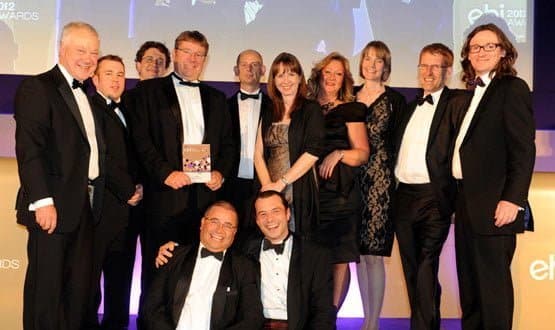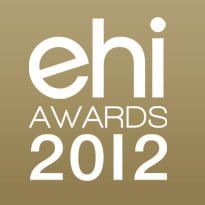Byrning bright
- 5 October 2012

The EHI Awards 2012 in association with BT were the sixth set of annual awards that eHealth Insider has organised; and they were much bigger than any previous event.
So much bigger that a balcony overlooking in the main hall of the Grand Connaught Rooms in Covent Garden had been pressed into use as seating space, and the doors to a side room flung open to accommodate more guests.
Irish comedian and compere Ed Byrne couldn’t resist making a joke out of the situation. “Welcome to all the people out there watching on the screens,” he said. “Isn’t it so much better than being at home watching me on tele?
“Here we are to celebrate the unsung heroes of healthcare; the backroom boys, as it were – and there you all, stuck in a back room.”
Commissioning and social media
In fact, the Grand Connaught Rooms looked stunning, with the tables lit up by columns of water in which orchids were suspended.
And there was no hiding the excitement of the first winners, Staffordshire Commissioning Support Services, who won the ‘most promising IT to support clinical commissioning’ for a model of insight and involvement project to support service change.
Lesley Goodburn, head of community relations, said: “We are ridiculously excited to have won, because we have worked so hard to get patient views heard.
“The solutions we have developed have been adopted by six clinical commissioning groups across Staffordshire, and three more are coming on board. It has been very hard work, but this award should really help to promote it.”
The next category up was ‘best use of social media in healthcare’, which was won by Breaking Free Online, a computer-led treatment programme for substance misuse that can be accessed through mobile devices as well as the internet.
Director Lloyd Humphreys said the project started just 18 months ago, “so it is great to get some recognition so early.”
He also argued the award should help to promote the service, which reaches out to people with alcohol and drug problems who “often hide away.” “This makes treatment available to everybody and this will help us to raise awareness of it,” he said.
IT enabled change, telehealth, safety and mobile working
EHI editor Jon Hoeksma noted, in his opening speech, that this has been a busy year for the NHS, with the Health and Social Care Bill finally making its way through Parliament, a new information strategy being published, and health secretary Andrew Lansley being replaced by Jeremy Hunt.
He said IT had an important part to play in helping the NHS to make sense of these changes. And the next award winner, the Royal Liverpool and Broadgreen University Hospitals NHS Trust, has been at the forefront of doing this.
The trust won ‘outstanding work in IT-enabled change’ for introducing the Medworxx case management system to the UK in a project that has allowed the trust to close a significant number of beds, while focusing care on patients.
Trish Armstrong-Child, director of operations, said: “We are extremely pleased to have won this award. We only set up this project a year ago, and we never expected to come so far, so fast. IT has been an enabler for changing the culture, and it has enabled us to sustain that change.”
Sometimes, however, it can be just as beneficial to use technology to improve basic care. NHS Lothian and East Lothian Council won the ‘best use of telehealth and telecare’ category for a project that uses fall detectors and chair and bed occupancy sensors to reduce falls in care homes by 37%.
Roz Eccles from NHS Lothian said her team was “delighted to have won” and the “recognition is very nice.”
A very different take on patient safety was demonstrated by the winner of the ‘best use of IT to promote patient safety” award, which was Public Health Wales for its Harm Reduction Database, Wales.
The database was set up in 2010, and it collects information from needle exchange programmes across the country, so it has robust information about the scale of injecting drug use and can plan suitable services.
Josie Smith, a research scientist at Public Health Wales, was so overwhelmed by the award that she had to sit on the steps outside the main hall to recover a little.
“I honestly never expected a judging panel to give an award to a project to support injecting drug users, because they are not a popular group,” she said.
“So it is so important to get this award. I am so delighted. I am so surprised. I just want to thank everybody involved very, very much.”
As Smith recovered, the next winners were announced as the Emergency Medical Retrieval Service, who won ‘best use of mobile technology in healthcare’ for a mobile service that makes standard operating procedures, maps, triage pathways and other vital information available to its staff.
Dan McKean, who helped to write the app, said he was also quite “shocked” to have won, because of the standard of the other entries. He added that the project would now be developed, to take in more user feedback and expand the platform across Scotland.
Major project emerges as overall winner
BT has been a long-term supporter of the EHI Awards, and Judith Halkerston, vice-president health, told the awards dinner that the company was “proud” to continue to sponsor them “at a critical time for the NHS.”
She said the awards judges had “enjoyed” the judging day at the Madjeski Stadium in Reading, at which all the shortlisted entries were asked to present to panels of NHS IT experts.
They had also been inspired by many of the entries, not least the eventual winner of the ‘excellence in major healthcare IT development’ award, which went on to scoop the overall prize at the end of the evening.
The winner of the two awards was Logica, for its Defence Medical Information Capability Programme, which created a single health record for every member of the UK armed forces, using the EMIS PCS and System C Medway systems in use in GP practices and acute trusts.
Neil Timms, Logica’s director of defence, said the project team was very aware of the importance of the work to the 200,000 people in the military. “This system works around the world, and it is very important in the current climate,” he said, citing its deployment at Camp Bastion in Afghanistan.
“The award will help to highlight what an important system this is, and how important IT is to delivering health services that make a huge difference to individuals and their families.”
New products, innovation in imaging, and leadership
Back in the NHS, the next winners were Mongoose and Mid Yorkshire Hospitals NHS Trust, who scooped ‘healthcare IT product innovation’ for their HealthView search engine, which enables massive amounts of structured and unstructured data to be searched quickly and easily.
Matthew Gittoes, managing director or Mongoose, said: “We are ecstatic, because a huge amount of work has gone into this. Many trusts have spent huge amounts of time and money scanning documents, only to find they cannot get the information out of them.
“HealthView not only does documents, it is an NHS Google. It is going to be huge for the NHS.” Paul Curley, clinical director at the trust, added: “We are very aware that previous EHI Awards winners have gone on to great things, and we really hope that we will, too.”
Burnbank Systems is one of the previous winners of an EHI Award, for its Imaging Exchange Portal. This year, the company was back to win ‘outstanding work in healthcare imaging informatics’; once more for the portal, which has developed significantly since it was first recognised.
Peter Young, the company’s managing director, said: “The [last] award increased our profile and what we were able to do. One of the big problems in the NHS is communicating what is going on, and the award certainly helped us to do that.”
Even the best products and projects can founder if they are not backed by good leadership. The EHI CCIO Campaign was set up to recognise the importance of clinical leadership in the NHS, and the CCIO Leaders Network has followed up by supporting aspiring and appointed chief clinical information officers in the health service.
This year’s awards included a new category, ‘the CCIO award for clinical IT leadership’ to reflect the importance of this work, and it was won by the Department of Health’s Informatics Directorate, for its Leadership for Informed Practice Programme.
This was set up to develop leadership capacity and capability among nurses, Susan Hamer, NHS Connecting for Health’s director of nursing, said: “We honestly never thought that we would win. It is very difficult for nurses in this space, and one of the reasons we wanted to put ourselves forward for this award was to get in front of the industry.”
Her colleague, Anne Cooper, the national clinical lead for nursing at the DHID, was far more outspoken. “I finished my last session yesterday with the last of the 300 nurses who have been through this programme,” she said. “It has been fantastic and I have this message for everybody here – the nurses are coming!”
Healthcare IT Champion of the Year
Another pair of award winners with big ambitions were Graham Gaulit and Roshini Saunders from The Scottish Government, which won ‘innovation in healthcare IT integration’ for the Eyecare Integration Project, which electronically connects community optometrists to hospital departments.
“This is a big, national programme,” Saunders said. “This will give it masses of added credibility. Now we need to roll it out across Scotland – and England, if we can.”
Finally, Jon Hoeksma and Ed Byrne arrived at the last of the award winners; the Healthcare IT Champion of the Year, the increasingly hotly contested category that is decided by the readers of eHealth Insider.
As the awards have expanded, so have the nominations for the champion award, which this year received a record number of entries and votes. The eventual winner was Neil Darvill, director of health informatics at St Helens and Knowsley Teaching Hospitals NHS Trust.
He said winning was “an amazing privilege” and a “complete surprise, because all the nominations were excellent, and it was an honour just to be associated with them.” He added that he hoped the awards would “give more publicity” to some of the many projects that the trust has in hand.
“NHS for ever!” he added, as he went back into the main hall for the mass photo of all winners. Ed Byrne closed by echoing the sentiment. “I do a lot of awards, mostly for the financial services sector, where people don’t really deserve awards,” he said.
“So, even though I’ve hardly understood a word that I’ve read out tonight, it’s been great to give some awards to real people, doing jobs that help people.”



